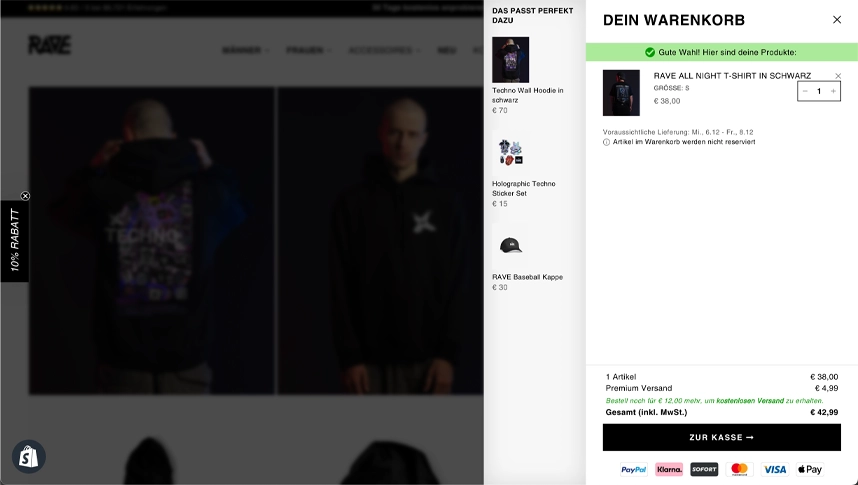Make Shopify legally compliant: GDPR-compliant in just 10 minutes

5 simple steps for your online store
When it comes to your Shopify store, legal security is paramount. In this article, I’ll show you how you can make your online store GDPR-compliant in just 10 minutes.
Legal compliance has never been easier – find out what steps you need to take to protect your Shopify store from legal pitfalls. From the integration of legal texts to the correct display of VAT and shipping costs – I will guide you through simple steps that will make your store not only GDPR-compliant, but also legally secure. Get ready to master the legal basics with ease and put your Shopify store on a solid foundation.
Table of contents:
- Integration of legal texts
- Cookie Banner
- Value added tax and shipping costs
- Payment methods
- Checkout design
1. integration of legal texts:
Let’s start with the integration of the legal texts. Many Shopify newbies often ask me “Where can I get legal texts?”. There are 2 possibilities. You can hire a lawyer to draw up individual legal texts tailored to your needs. Or you can use an AGB generator. Option number one is the “safest” solution, but involves enormous costs that can rarely be borne by small companies. Option number two offers the best price-performance ratio and is the preferred solution for most small to medium-sized companies. Especially if you are not selling a complex product or there are no special legal cases to consider, we recommend that our customers use a legal text generator such as the one from eRecht24.
With the simple “legal text package” from eRecht24, you can easily and inexpensively create terms and conditions, revocation instructions, privacy policy and legal notice. The package allows you to generate the required texts yourself. A special highlight: the easy integration of the eRecht app into your Shopify store. This means that your legal texts are always up-to-date and automatically adapted to new legal requirements. Save time, money and nerves and make your Shopify store legally compliant and future-proof with the “legal texts package” from eRecht24! Create your account, generate your texts, install the app and log in to your account – and your legal texts are already integrated into your Shopify store.
If you already have legal texts, go to “Settings” > “Legal“ in your Shopify admin and add your legal notice, terms and conditions, data protection and withdrawal policy. The legal texts are then automatically displayed in the Shopify checkout. Now all you have to do is link your legal texts in your footer and the issue is resolved.

2. cookie banner:
The legally compliant integration of a cookie banner into your Shopify store is of great importance, as data protection guidelines are becoming increasingly strict and compliance with legal regulations is essential for store operators. A cookie banner is used to inform your visitors about the use of cookies and to obtain their consent. To ensure that the cookie banner complies with the legal requirements, you should follow a few important steps. First of all, it is important to provide transparent and easy-to-understand information about cookie use. This includes the type of cookies used, the purpose of their use and the possibility for your visitors to give or refuse their consent.
An effective implementation involves customizing the cookie banner to the design of your Shopify store to ensure seamless integration. This can be achieved by adjusting colors, fonts and positioning to ensure that the banner is unobtrusive yet highly visible. Shopify offers several apps that make it easier to implement a cookie banner and ensure that it complies with legal requirements. The configuration should be such that only necessary cookies are activated by default, while visitors have the option of activating or deactivating optional cookies according to their preferences. In most cases, we use the app for our customers: Consentmo GDPR Compliance.
Finally, it is necessary to regularly review and update your cookie banner to ensure that it complies with new data protection regulations. A transparent and legally compliant cookie policy not only strengthens the trust of your customers, but also protects you from legal consequences in connection with breaches of data protection regulations.

3. value added tax and shipping costs:
The correct integration of VAT and shipping information in your Shopify store is crucial to meet legal requirements and ensure transparency towards customers. Shopify offers various options for displaying this information in a legally compliant manner and placing it in the right places. First of all, you should make sure that the prices in your store already include the applicable VAT rates. This ensures transparency and prevents misunderstandings for your customers. Shopify makes it possible to display prices including VAT and automatically calculate the correct tax rates depending on the customer’s location. You can store the VAT rates in your Shopify backend under “Settings” > “Taxes”. All you have to do now is add the note “incl. VAT” to your product page. In most themes, you can activate this via a checkbox in your theme settings.
A clear and unambiguous indication of shipping costs is also very important. This should already appear on the product page to inform potential buyers about additional costs at an early stage. Add a reference to your shipping costs on the product page and link to any existing subpage that describes the topic “Shipping & delivery” in more detail. If you offer free shipping, it is advisable to include the note “incl. free shipping” on the product page. You configure the shipping costs via your Shopify backend under “Settings” > “Shipping & delivery”.
The timely communication of VAT and shipping information not only strengthens the trust of your customers, but also ensures that your Shopify store complies with legal requirements. A transparent presentation of this information helps to avoid unpleasant surprises for customers and also increases the conversion rate.
In life, many people know what to do, but only a few actually do it. Knowledge is not enough! You have to act.
Tony Robbins
4. payment methods:
It is crucial to inform your customers transparently about the payment methods available in your online store in order to improve the shopping experience and avoid potential uncertainties. Shopify facilitates this communication by enabling store operators to store a variety of payment methods under “Settings” > “Payment methods”. A recommended practice is to enable Shopify Payments and PayPal, as these widely used payment options cover a wide range of customer needs. Shopify Payments offers an integrated solution for credit card payments, Sofortüberweisung and Klarna Invoice Purchase, while PayPal is a trusted and widely used digital payment option.
For customers looking for an additional basis of trust, activating Amazon Pay could also be an advantage. This option allows your customers to use their Amazon payment information to speed up the checkout process and ensure a seamless transaction. Once these payment methods have been activated, it is important to provide customers with information about them. Many Shopify themes automatically integrate this information into the footer of your website. This area is often visible and offers an ideal position to inform your customers about which payment methods are accepted in your store.
Clear communication about available payment methods promotes the trust of your customers, increases transparency and helps to reduce abandonment in the checkout process. Ultimately, it is an important step in strengthening customer loyalty and ensuring a smooth shopping experience.

5. checkout design:
It is crucial to make your Shopify checkout legally compliant in order to meet legal requirements and increase customer trust. One important measure is the activation of a confirmation step for the General Terms and Conditions (GTC) and the withdrawal policy. This can be done under “Settings” > “Checkout”. The integration of a confirmation step ensures that your customers are explicitly made aware of the terms and conditions of your online store and agree to them before they complete an order.
It is also essential to show shipping costs transparently. This can be done as described in step 3 under “Settings” > “Shipping & delivery”. The clear presentation of shipping costs not only ensures transparent communication, but also prevents surprises for customers during the checkout process.
The combination of these legally compliant measures not only creates a positive shopping experience, but also minimizes the risk of legal conflicts. A well thought-out and transparent checkout process is not only in the interest of the customer, but also strengthens trust in the Shopify store by showing that legal requirements are respected and adhered to.
Get the best apps for your Shopify store: Discover the top apps that will take your store to the next level, increase your sales and inspire customers.
Warnings:
Finally, I would like to point out possible warnings under competition law that can be avoided by designing your online store in compliance with the law. Such warnings can be issued both by competitors and by qualified associations. Should a warning letter be issued, it is advisable to seek legal advice in order to check the legality and respond appropriately.
Note:
No legal advice by means of individual page contents or guarantee for legal information. Insofar as our offers contain legal explanations, recommendations and guidelines, this is non-binding information without any guarantee of completeness and correctness. This content is not to be understood as legal advice, and our online offer in no way claims to provide or replace such advice.
It goes without saying that we make every effort to provide you with information to the best of our knowledge and belief. Nevertheless, the complexity and ongoing changes in the legal matters covered mean that liability and warranty are excluded insofar as this is permissible within the framework of the current legal situation.
